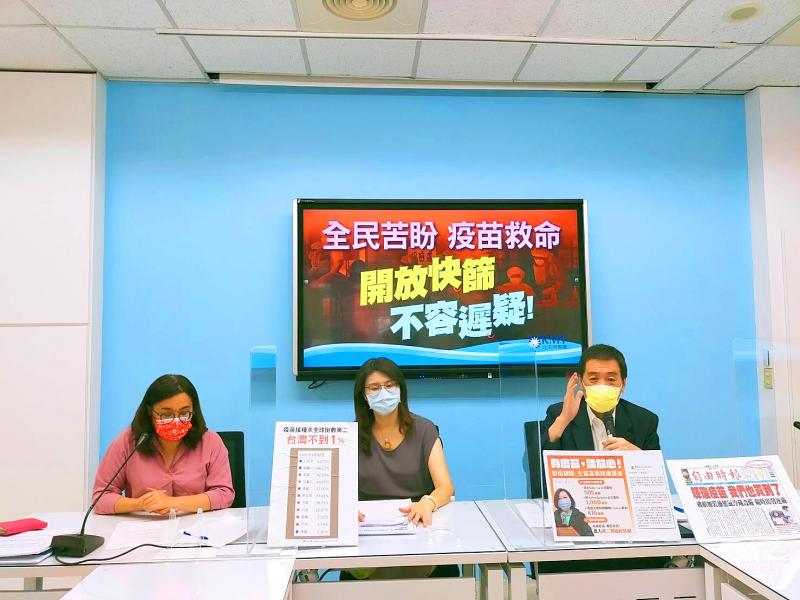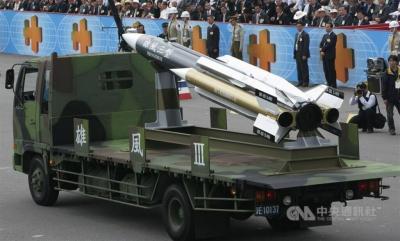The government should tell the public when Taiwan is expected to have vaccination coverage of at least 60 percent of the population, Chinese Nationalist Party (KMT) Culture and Communications Committee director-general Alicia Wang (王育敏) said yesterday.
So far, the government has not been able to give people a clear response as to when that goal is likely to be achieved, Wang told an online news conference from Taipei.
President Tsai Ing-wen’s (蔡英文) administration has a responsibility to answer this question and should not avoid it, Wang said.

Photo courtesy of the KMT Legislative Caucus Office
“Taiwanese are very worried right now,” and what they hope for the most is for COVID-19 vaccines to arrive soon, she said.
Foreign and local experts, as well as reports by international media outlets, agree that Taiwan’s lack of COVID-19 vaccines has formed a “breach” in its COVID-19 prevention efforts, she said.
So far, the nation has only obtained about 710,000 COVID-19 vaccine doses, she said.
However, nearly 30 million vaccine doses would be needed for 60 percent coverage, Wang said.
The Tsai administration has been inefficient in purchasing and administering COVID-19 vaccines, she said.
Globally, Taiwan ranks near the bottom in terms of its COVID-19 vaccination rate, which is far from that of neighboring countries such as South Korea and Japan, Wang said.
As of Friday, only 1.2 COVID-19 vaccine doses had been administered for every 100 people in Taiwan, she said, citing data from the online publication Our World in Data.
That is compared with Israel’s rate of 121.9 doses per 100 people, she said, adding that other countries, including China, India, Singapore, the UK and the US, have far higher vaccination rates.
South Korean President Moon Jae-in has been focused on international cooperation so that his country can manufacture vaccines, the KMT said in a statement.
In contrast, despite facing a “less stressful” domestic COVID-19 situation over the past year, the government appears to not have a complete plan for vaccine acquisition and development, it said.
“The KMT urges the Tsai administration to do everything it can to secure more vaccines for Taiwan at the soonest possible time and make public in detail their plans to do so,” the KMT said. “Only by doing so will people be effectively protected from the COVID-19 pandemic.”
In related news, a group of China Unification Promotion Party (CUPP) members held a small protest outside the Central Epidemic Command Center in Taipei yesterday afternoon, demanding that health authorities allow Chinese-made COVID-19 vaccines to be used in Taiwan.
CUPP founder Chang An-le (張安樂), in a video released from Shanghai on Sunday, said that CUPP members would shadow Minister of Health and Welfare Chen Shih-chung (陳時中) wherever he goes to pressure him to accept Chinese-made vaccines.
“Only the Chinese Communist Party has real love for Taiwan, Taiwanese people’s health and their well-being. The [Taiwanese] politicos only love Taiwanese dollars and their political power,” he said in the video.
Democratic Progressive Party lawmakers said that Chang’s words and CUPP members’ actions amounted to “gangsters using blackmail,” and asked for the issue to be investigated, as Chang had threatened the health minister.
Additional reporting by Chen Yu-fu

STATS: Taiwan’s average life expectancy of 80.77 years was lower than that of Japan, Singapore and South Korea, but higher than in China, Malaysia and Indonesia Taiwan’s average life expectancy last year increased to 80.77 years, but was still not back to its pre-COVID-19 pandemic peak of 81.32 years in 2020, the Ministry of the Interior said yesterday. The average life expectancy last year increased the 0.54 years from 2023, the ministry said in a statement. For men and women, the average life expectancy last year was 77.42 years and 84.30 years respectively, up 0.48 years and 0.56 years from the previous year. Taiwan’s average life expectancy peaked at 81.32 years in 2020, as the nation was relatively unaffected by the pandemic that year. The metric

Taiwan High Speed Rail Corp. (THSRC) plans to ease strained capacity during peak hours by introducing new fare rules restricting passengers traveling without reserved seats in 2026, company Chairman Shih Che (史哲) said Wednesday. THSRC needs to tackle its capacity issue because there have been several occasions where passengers holding tickets with reserved seats did not make it onto their train in stations packed with individuals traveling without a reserved seat, Shih told reporters in a joint interview in Taipei. Non-reserved seats allow travelers maximum flexibility, but it has led to issues relating to quality of service and safety concerns, especially during

A magnitude 5.1 earthquake struck Chiayi County at 4:37pm today, the Central Weather Administration (CWA) said. The hypocenter was 36.3km southeast of Chiayi County Hall at a depth of 10.4km, CWA data showed. There were no immediate reports of damage resulting from the quake. The intensity of the quake, which gauges the actual effect of a seismic event, measured 4 in Chiayi County, Tainan and Kaohsiung on Taiwan's seven-tier intensity scale, the data showed. The quake had an intensity of 3 in Chiayi City and Yunlin County, while it was measured as 2 in Pingtung, Taitung, Hualien, Changhua, Nantou and Penghu counties, the data

The Supreme Court today rejected an appeal filed by former Air Force officer Shih Chun-cheng (史濬程), convicted of Chinese Communist Party (CCP) espionage, finalizing his sentence at two years and two months for contravening the National Security Act (國家安全法). His other ruling, a ten-month sentence for an additional contravention, was meanwhile overturned and sent to the Taichung branch of the High Court for retrial, the Supreme Court said today. Prosecutors have been notified as Shih is considered a flight risk. Shih was recruited by Chinese Communist Party (CCP) intelligence officials after his retirement in 2008 and appointed as a supervisor